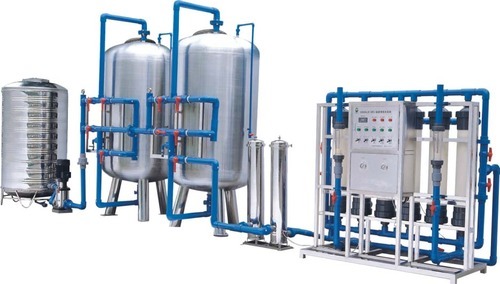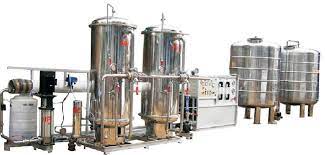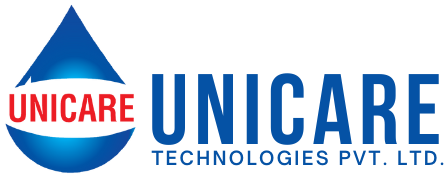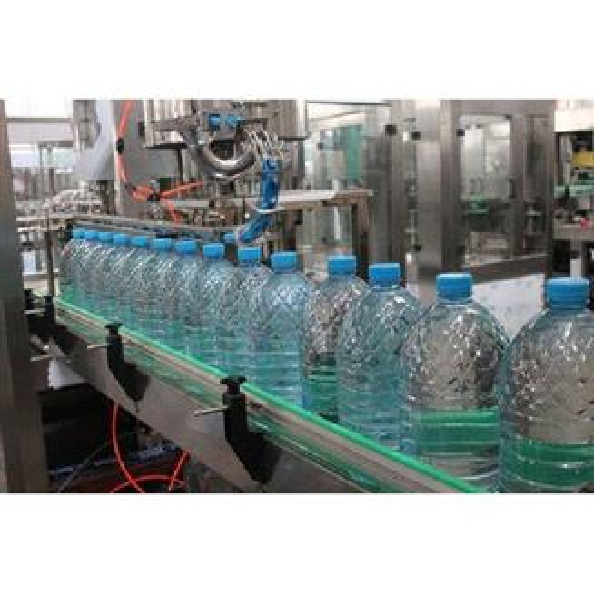
Packaged Drinking Water Plant
We offer a wide range of industrial reverse osmosis Plants, according to We need for tap water, brackish water & sea water application. The production range starts from 100 LPH (Liter per hour) to 100 M3 per hour for 400 IBS to 45,000 TDS and reduce TDS @ 90-99% .
All our industrial reverse osmosis Plants are carefully customized and configured to suit the individual requirement of the output water, which varies from normal drinking application to the specific usage, such as food Processing, pharmaceuticals and boiler feeding requirement. This is done through an in depth and complete chemical analysis of the feed water available to us in specific location.
Reverse Osmosis has gained wide acceptance and popularity due to its simple operation and the ability to withstand variations in feed water quality.

Safient Features :
- Produce high-quality dematerialized water
- Most modern membrane technology
- Modular design
- Low water-rejection rate
- Low operational and maintenance costs

Following Facilities & machineries will be required to start up a package drinking water project.
Primary Requirement:
- Borewell OR raw water source
- Raw Water Storage Tank as per Plant Capacity
- Constructed Area (Flooring, Walls, ceiling and Partitions as per BIS requirement)
- Power supply
- Laboratories facility (As per BIS requirement)
Packaging Machineries: (As per requirement):
- PET Blow Molding Machine (Capacity Bottle per Hour: 700, 2400, 4800)
- Rinsing, Filling & Capping Machine (for0.5L, 1L & 2 Liter Bottle) with Conveyor, Shrink tunnel and Printer. (Capacity Bottle per Hour: 700, 1400, 2400, 3600)
- Pouch Packing Machine (Capacity Pouch per Hour: 2200)
- 20 Liter Jar Rinsing, Filling and Capping Machine (Capacity Jar Per Hour: 200 )
- Automatic Glass Rinsing, Filling & Sealing (Capacity Cup Per Hour: 1400-1500 )
A packaged drinking water plant is a water treatment facility that produces safe and purified water for drinking purposes. The plant is designed to treat raw water from various sources, such as underground wells, surface water, and municipal supplies, and produce clean and safe drinking water that meets regulatory standards.
The packaged drinking water plant typically consists of several stages of water treatment, including pre-treatment, filtration, disinfection, and packaging. In the pre-treatment stage, the raw water is screened to remove large particles and then passed through a series of filters to remove suspended solids, turbidity, and other impurities.
Next, the water is treated with disinfectants, such as chlorine or ozone, to remove any remaining microorganisms that may be present. After disinfection, the water is passed through a series of activated carbon filters to remove any remaining organic impurities.
Finally, the water is packaged in bottles or containers that are sealed to prevent contamination during transport and storage. The packaged water is then labeled and distributed for sale to consumers.
Overall, a packaged drinking water plant is an important investment for businesses that need to produce and sell clean and safe drinking water. It is also critical for areas where access to safe drinking water is limited or non-existent. By producing high-quality drinking water, packaged drinking water plants can help promote public health and provide a reliable source of clean water for communities.

